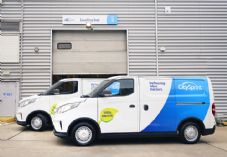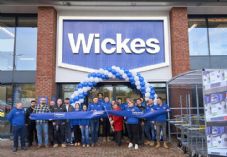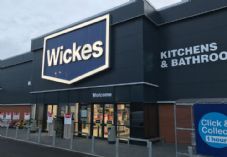UK DIY News
Wickes Posts Q2 Growth; Maintains Guidance

- Improved second quarter drives positive first half LFL performance; full year expectations maintained
- Revised capital allocation policy supports a maintained dividend and £25m share buyback programme
Wickes today reports an improvement in second quarter trading, with LFL sales growth of 3.0%. Despite a challenging consumer environment, group LFL sales for the first half were +0.7% year on year.
Wickes also announces a new capital allocation policy, which reflects confidence in the company’s strategy, a strong balance sheet and a focus on delivering shareholder returns.
David Wood, CEO of Wickes, commented:
“This has been an encouraging first half where we have again seen the benefits of our uniquely balanced business model delivering well for customers. Our performance has been underpinned by further momentum in Trade, as local traders continue to turn to Wickes to save them time and money, an improving trend in DIY, and a good performance in Do-It-For-Me. As we continue to make progress across our strategic growth drivers, we are confident in the Group’s prospects for both the remainder of this year and the longer term.
We are also pleased to announce our revised capital allocation policy, which reflects confidence in the company’s strategy and business model. The policy focuses on delivering additional shareholder returns through a maintenance of the FY2023 dividend and the launch of a £25m share buyback programme.”
Trading update
LFL sales | Total | Core | DIFM |
Quarter 1 (13 weeks to 1 April) | (1.8)% | (4.4)% | 6.2% |
Quarter 2 (13 weeks to 1 July) | 3.0% | 2.3% | 5.3% |
First half (26 weeks to 1 July) | 0.7% | (0.8)% | 5.8% |
Core LFL sales were ahead by 2.3% in the second quarter, with categories such as decorative and construction performing well and outdoor projects benefiting from a normalisation of weather patterns. Click and collect sales have performed particularly well, growing by 5.6%, reflecting the service improvements made to our proposition.
Within Core, Trade sales performed well, reflecting continued healthy order pipelines for local trade professionals. Our strategically important TradePro customer base continues to grow strongly. DIY sales have seen an improving trend over the period, although remain lower year-on-year. Inflation continues to slow, in line with our expectations, falling from 9% in the first quarter to 4% in the second. Wickes continues to retain its strong price position relative to the sector.
Our Do-It-For-Me (DIFM) showroom business saw good LFL sales growth of 5.3% on a delivered basis, a slight decline quarter-on-quarter as we continue to work through the elevated order book. Ordered sales in the first half were up modestly, with bathrooms again performing well.
Costs remain well controlled, with savings flowing through as expected in distribution, logistics and store operations.
Six store refits have been completed in the year to date, and the first new store this year at Chelmsford will open imminently. Two further openings are planned before the year end.
Capital allocation update
Wickes today announces a new capital allocation policy which reflects confidence in the company’s strategy, a strong balance sheet and a focus on delivering shareholder returns. The new policy incorporates the following:
- Balance sheet strength - a strategy of maintaining a strong balance sheet with significant liquidity available at all times, reflecting a business with lease obligations and operational gearing;
- Focus on cash and not lease-adjusted debt - Wickes’ lease debt is materially influenced each year by lease lengths and renewal profiles, whilst the actual rent paid each year remains relatively constant. Therefore we are moving away from lease-adjusted debt as our primary balance sheet metric and will focus on cash;
- Our primary balance sheet metric moves to at least £50m of cash at our financial year end - Wickes’ December cash position is a seasonal low point each year, with the average across the year typically being £30-50m higher. Our new policy will ensure that in a normal trading cycle we will not need to draw on our £80m RCF, although this facility is being retained to provide additional flexibility;
- Growth levers continue to be prioritised - capital investment of c.3% of sales, before the impact of IAS38 (see below), will focus on maintaining our store estate and investing in our high-returning proven growth levers - including store refits, new stores and digital capability;
- Dividend policy targets a dividend cover of 1.5x - 2.5x adjusted EPS - our dividend policy will move to a cover range of 1.5 - 2.5x adjusted EPS, from the historical approach of a 40% adjusted Profit After Tax (PAT) payout ratio;
- Plan to maintain FY2023 dividend at 10.9p - based on a strong balance sheet and confidence in the business performance we plan to maintain the FY2023 dividend at 10.9p per share. Together with the impact of IAS38 on our adjusted PBT, dividend cover will initially be outside our new target range. The Board intends to maintain the dividend at 10.9p until cover moves back into the target range as profits recover;
- Share buyback of £25m announced today - given our revised balance sheet metric, and the current outlook for the business, surplus cash currently exists. We plan therefore to start returning excess cash to shareholders and today announce a share buyback programme of £25m[1], which will commence as soon as practically possible.
Accounting for IT investments
As part of the update on capital allocation, Wickes today sets out more detail on its future IT investment:
- We have now successfully completed the systems separation from Travis Perkins (TP). During the separation process we have transferred across all key applications to be under Wickes’ control, developed our own in-house IT function and moved all key systems on to cloud-based infrastructure;
- The company has been working to identify further IT opportunities and we have now started implementing the IT roadmap that will underpin the next phase of our digital strategy - to modernise the systems inherited from TP, to improve our customers’ online experience and to increase the efficiency of our operations. IT project investment is anticipated to be c.£17m in FY2023 and grow to c.£25m per year from FY2025;
- We expect the majority of our future investments to be in Software as a Service (SaaS) applications, supplied by third party providers. As a result, and in line with the IAS38 accounting clarification regarding SaaS expenditure, we now envisage that 50-75% of future IT project spend will be expensed rather than capitalised;
- The impact of this switch from capex to opex for some investment costs will have no effect on future cash flow. For four years PBT will be reduced until the higher IT opex is fully offset by lower IT amortisation costs. We estimate the impact on PBT to be £8-10m in FY2023, £6-11m in FY2024, £4-7m in FY2025 and £1-3m in FY2026;
- Our reported adjusted PBT going forward will be after the impact of IAS38 accounting. In FY2023 only, we will also reference adjusted PBT before the impact of IAS38 (ie the profit that would have been delivered if all of the IT investment had been capitalised), in order to align with analysts’ original forecasts for the year.
Further details on the capital allocation policy and the accounting for IT investments are available in a short presentation available on our website (www.wickesplc.co.uk).
Outlook
On a Pre-IAS38 Adjusted PBT basis, the Company is comfortable with the market consensus for FY2023, being a range of £54.5-57.0m.
Source : Wickes PLC
I find the news and articles they publish really useful and enjoy reading their views and commentary on the industry. It's the only source of quality, reliable information on our major customers and it's used regularly by myself and my team.











































